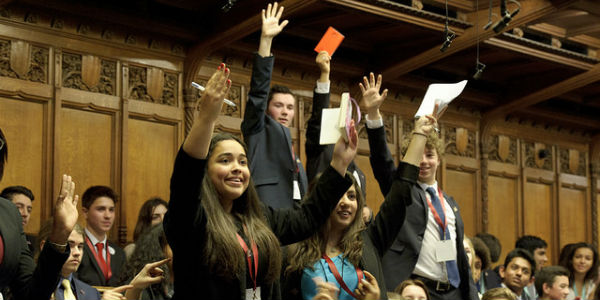A citizens’ convention for UK democracy is more necessary with every passing day
Many democratic societies have benefited from establishing conventions of citizens chosen at random to deliberate on major constitutional questions. Now is the time for the UK to have its own citizens’ convention, argue Graham Allen and Andrew Blick, to rebuild and renew our fractured representative democracy.

Youth Parliament, Westminster. Picture: UK Parliament, via (CC BY-NC 2.0)
Just two years ago there was discussion across the political spectrum of the idea of holding a ‘citizens’ convention on UK democracy. It – like so much else – was overshadowed by the cry of anger and frustration that was the vote for Brexit. We need to return urgently to this project – not least as a response to that scream. The stakes are high: make our democracy work or possibly lose it. The purpose of the convention would be to provide a holistic overview of the way in which we are governed. It would consider a wide range of challenges faced by our political system. Its remit could take in, for instance, the electoral system, the balance of power between devolved, central and local government, the relationship between Parliament and the executive, the composition and powers of the second chamber at Westminster and the protection of rights. But the convention would not just be another debating forum. To be effective the convention would have to have a political endgame. Political leaders would have to accept that it would make recommendations for tangible reforms and improvements with a view to them being put to Parliament to be implemented or amended. This process in itself would give individual MPs the chance of a lifetime to help rebuild representative democracy based on a strong independent Parliament tackling the awesome power of governmental sovereignty.
Many democratic societies around the world have benefited at some point in their history from some form of convention that has helped to found or reinvigorate their democracy. While the UK system has many strengths, it is perhaps not so good at reflecting in considered, inclusive fashion on how it functions, and how it might be improved. A citizens’ convention on UK democracy would enable it to do so.
Such a body might wish to include as non-voting members representatives of the political parties. They would bring with them an understanding of how the existing system works in practice, and knowledge of the possible viability of proposals for change. Moreover, if the recommendations the convention issues are to have a realistic chance of being implemented and used, buy-in from the politicians, to whom will fall the task of enacting the proposals, is essential.
But the convention would also need to be more than a traditional ‘great and good’ exercise. While participation from members of the political elite would be both necessary and welcome, its membership should reach beyond the usual circles. The assembly could comprise members of the public chosen at random. Their participation would provide a fresh perspective on the issues under consideration. It would also potentially provide the outcomes of the convention with an added democratic legitimacy. They might be seen to represent more than a carve-up between senior politicians, so command wider public support, making it harder for the parties to ignore them. Hopefully, this would lead to a cross-party pledge, perhaps included in identical or similar wording in multiple manifestos, to implement some or all of the proposals.
This approach would be in line with international good practice, as employed recently in projects in countries including Canada, the Netherlands and Ireland. While the participants chosen at random would be non-expert, they would be provided with expert briefings on the issues the convention addressed, in the light of which they would reach conclusions. There is every reason to suppose that they would be capable of performing the task. As well as being used for assemblies around the world today, ‘sortition’ – the random recruitment of participants in public bodies – has long lineage. It was used in Ancient Greek democracies and has long been integral to our domestic legal system, in the form of the jury.
Yet, however desirable a citizens’ convention on UK democracy might seem in theory, there have been important barriers to properly initiating such a process. Persuading the major parties first to recognise the value of this idea, second to overcome an inbuilt aversion to surrendering power to a process they cannot control, and third to make it a political priority is not easy. It is easy for politicians, and others who are suspicious of this proposal, to claim that there is no popular demand for a thorough overhaul of the system, and that the kind of emergency that might force it onto the agenda is lacking. They also raise various technical issues about how it would work in practice. Nonetheless, interest was developing in a convention in influential circles during 2016. Then the EU referendum of 23 June of that year produced a ‘leave’ vote.
This occurrence has served to dominate our political environment ever since, distracting from many other concerns that might otherwise be more central. One such casualty of this immense political shock was the putative peoples’ convention on UK democracy. In such an uncertain environment, it became difficult to obtain commitments either from the parties or potential financial supporters. They tended to see the idea a diversion form more urgent concerns. Some of them also held that the referendum and the way it was fought had served to contaminate the whole idea of involving the public in political decision making. Previously, the lack of a crisis was presented as a reason not to hold a convention. Now the existence of a crisis was used as a reason not to instigate this process.
Questions around Europe have more than their share of public time and should not form part of the agenda. But it has served to highlight that our current neglected democratic framework is not fit for purpose – it has been taken as given and so has not been properly serviced, maintained and updated. What form must our constitution take to maintain our democracy? How will repatriated powers be divided between the centre and the devolved territories? What will be the relationship between Parliament and the executive? How will the courts fit into this new arrangement? Our existing methods of political deliberation have singularly failed to resolve these issues. They call for a special mechanism outwith the control of government or the legislature to formulate the answers.
There are some encouraging signs. Plans are in hand to establish a Citizens’ Assembly in Northern Ireland; and the Constitutional and Legislative Affairs Committee of the Welsh Assembly has proposed a ‘Speakers’ Conference’, between the speakers of the UK Parliament and the different devolved legislatures, to coordinate cross-UK democratic deliberation and accountability. These ideas are welcome. But it is now time to have a fully blown convention of citizens for the whole UK, to seek a new settlement for us all, on behalf of us all.
This article represents the views of the authors and not those of Democratic Audit.
About the authors
 Graham Allen was MP for Nottingham North (1997–2017) and Chair of the House of Commons Political and Constitutional Reform Select Committee between 2010 and 2015.
Graham Allen was MP for Nottingham North (1997–2017) and Chair of the House of Commons Political and Constitutional Reform Select Committee between 2010 and 2015.
 Andrew Blick Is Senior Lecturer in Politics and Contemporary History, King’s College London.
Andrew Blick Is Senior Lecturer in Politics and Contemporary History, King’s College London.





 Democratic Audit's core funding is provided by the Joseph Rowntree Charitable Trust. Additional funding is provided by the London School of Economics.
Democratic Audit's core funding is provided by the Joseph Rowntree Charitable Trust. Additional funding is provided by the London School of Economics.
One idea is not to have political parties where the whip is applied to force people to vote against their own integrity and make them reluctant to listen to citizens, in case they want something different from the party. To keep free of anyone’s control, we need to have a fair system at election time. It cannot be right that the biggest mouthpiece wins. The amount spent by a candidate is supposed to be controlled, but parties who broke it still benefitted from their cheating and the election was not rerun. Indeed, it is bizarre that at election, my taxes are used to fund my party political competitors, only. One man one vote feels like democracy, unless that vote is brought under party control, where it is one man, 50 votes, the number of people in the party. It does not feel like good, clean democracy when bought with promises and veiled threats, swapped and propped up by expensive PR machines, not equally open to all sides. A fairer voting system would mean more voices are heard at the table and the chances of getting the best decisions for all our residents greatly increased.
Marianne
completely agree with your sentiments. The brainwashing that goes on in social media is scary and the electoral commission is way behind the curve (why?). This would be a huge topic for a citizens assembly to tackle. And not much from academia – mainly news from journalist Carol Cadwalladr.
Oh no. More liberal left Guardian rubbish. It’s the last thing the country needs at the moment.
Absolutely agree but of course a randomly chosen “Citizens’ Assembly” of this nature could only succeed with endorsement and succour (in the form of necessary funding) from the incumbent UK Govt. Administration and there seems little prospect of that happening whilst the Conservative Party have any meaningful role in said administration – this is not to suggest that a single party Labour administration would be more sympathetic – in fact for any such platform to come into being with a realistic prospect of delivering real and effective change would require a balanced (or hung) Parliamentary complexion in Westminster with any party other than the Conservatives (so that means Labour) as the single largest party in a coalition (of some construction). That way the major partner in government would not be in a position to torpedo the convention platform’s major recommendations, which would undoubtedly include abandoning First Past the Post as the voting system for Westminster Parliamentary elections – that single change alone would shake the foundations of UK political discourse to its very core and profoundly transform the nature of UK governance. So the power to change Britain really does lie in the hands of ordinary voters whenever the next election comes round – Corbyn as PM yes but with his hands tied by the interests of a n other political party players?
As to a suitable venue for such a Convention, I nominate the ancient city of York.
yes, yes, YES!
But surely the remit must include an understanding of the benefits of democracy i.e. what outcomes might we expect from improving democracy? Then discussion would be about how to get there, how democracy actually works. These discussions would inform the issues raised in the article and how they can best be addressed.
I’ve been considering the why and how of democracy – and there seems to be not much written about it. It needs to be thought through.
Finally I feel this convention should proceed whiter or not the government sign up to it.